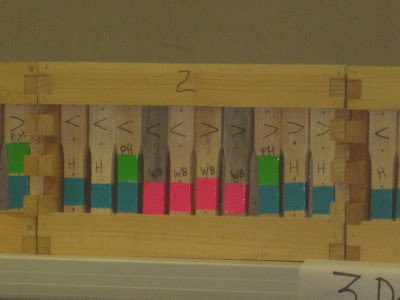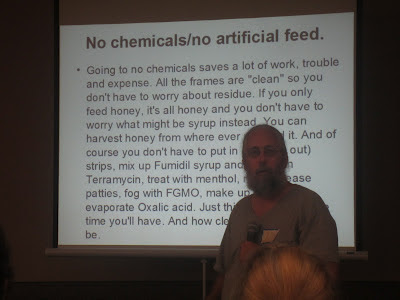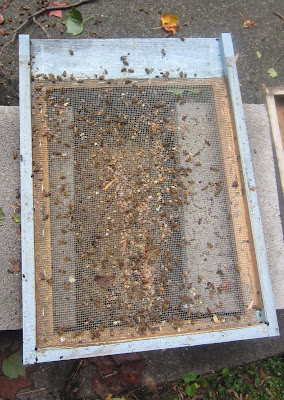During the NE Treatment Free Beekeeping Conference (which I am now going to call the NETFB to save typing), the emphasis was on healthy bees. I learned a lot about balance in the hive, nutrition on every level, and respect for nature and evolution.
Michael Bush set the tone in his first talk about healthier bees. He discussed microorganisms in the hive. There are 30 kinds of mites, 30 kinds of insects and some 8000 microorganisms in the bee hive. When we treat we affect the hive ecology. Everything that is put in the hive as a treatment - whether "natural" or not - kills microorganisms. Dean Stiglitz and Laurie Herboldsheimer (hosts of the conference) have done a
small experiment just to show the influence of oxalic acid on yeast in general. Their point is that whatever we introduce into the hive, we are affecting the ecology of the hive.
If you take the "no treatment" approach, then you are inviting the bees to experience selective pressure to evolve stronger bees who can withstand the varroa mite or whatever the next bee scourge might be. What happens with treatment is that we strengthen the mite who becomes more virulent and prolific. If we don't treat, according to Michael, the pressure is where it should be - on the pest/parasite to be in balance with its host.
So Michael advocates (and you can read what he talked about on his website - click on
Four Simple Steps to Healthier Bees on the left side column)
- No Treatments of any kind
- Breed local survivor queens
- Only natural food (honey and real pollen)
- Use natural comb
To the point of only feeding natural food, Michael pointed out that the Ph of sugar syrup is 6 vs. that of honey which is 3.2 A lower Ph is more acidic and all brood diseases thrive more in sugar syrup than in honey.
He has a PowerPoint on his website on
natural cell size which you can also find in the left column on the linked page.
Dean Stiglitz, seen below, gave a talk on raising local queens. I own but have only leafed through his book written with Laurie:
The Complete Idiot's Guide to Beekeeping, and this conference and meeting him sent me home to pore over it. He is the consummate researcher and researches other people's research. He also gave a talk at the conference on how to read a research study to know if the results are something to rely on or not.
Again, in his queen-raising talk, the emphasis was on bee health. To be a well-developed queen, the queen must be fed well. So a hive must have stored food, pollen, and young worker bees to make a good queen. He encouraged a
walk-away split as one way to encourage the bees to make their own queen. The queenless side of the split will be the cell builder. If you put that half of the split in the old hive's location, then the foragers will return to it, adding to the food in the colony.

Another interesting talk for me was by Dee Lusby. Dee and her late husband Ed raise bees in Arizona. She was a little difficult to understand - I expect one learns more from visiting her at her apiary than hearing her speak, but I learned a lot from her about
Housel positioning.
She pronounces it "HOO sul" - I've been calling it "How sul" so I am mending my ways going forward. What I understood about Housel positioning is that when you put foundation, a foundation strip, or drawn comb into a hive, it's important that the inside of the cell have the "Y" at the bottom of the cell facing up on the frames from the center to the outside of the hive. In the center it switches and the "Y" should face up going toward the nearest side.
I just thought that for some reason that was better for the bees, but instead there is an explanation that again has to do with balance in the hive. If the "y" is facing up, then the bees use that upper "v" of the "Y" as a guide for the beginning of their comb. And for the honey, for example, to stay in the cell, the slant of the cell has to be downward toward the center.
If the cells are not set that way, then it confuses the bees' system and their balance in the hive. This is also why it is so important to put a frame back into a box in the same orientation in which it was originally.
Jeff and I do all of our hives this way, but only because I thought we were supposed to - now I understand why it is important.

Dee also talked about opening up the brood box in a pyramidal way by placing capped brood in the center of the box with a full frame of honey on either side of the capped brood (for insulation of the brood and for food provision). She had a complex system of numbered frames to explain this to us.

There were other good speakers -
Kirk Webster talked about overwintering nucs, but I'm not going to try to cover that in this post. And Michael gave another talk on what he calls "Lazy Beekeeping" addressing issues I already talk about in this blog all the time: 8 frame mediums, foundationless frames, etc.
Paul Arnold who anchors the Young Harris Institute was also there, but we missed his talk on Thursday night and on Sunday. It was fun hanging out with Paul, though, and Julia, Noah, and I ate several meals with him.
BTW, here's a picture of the Atlanta contingent with Michael Bush in front of his table of books that he was selling. We left a space in our line-up so that his books might show up in the picture, but they don't really.


So I came away resolved to try to succeed at splitting my successful colonies, to forget feeding even bee tea, and to try to emulate my natural beekeeping mentors and heroes.






































